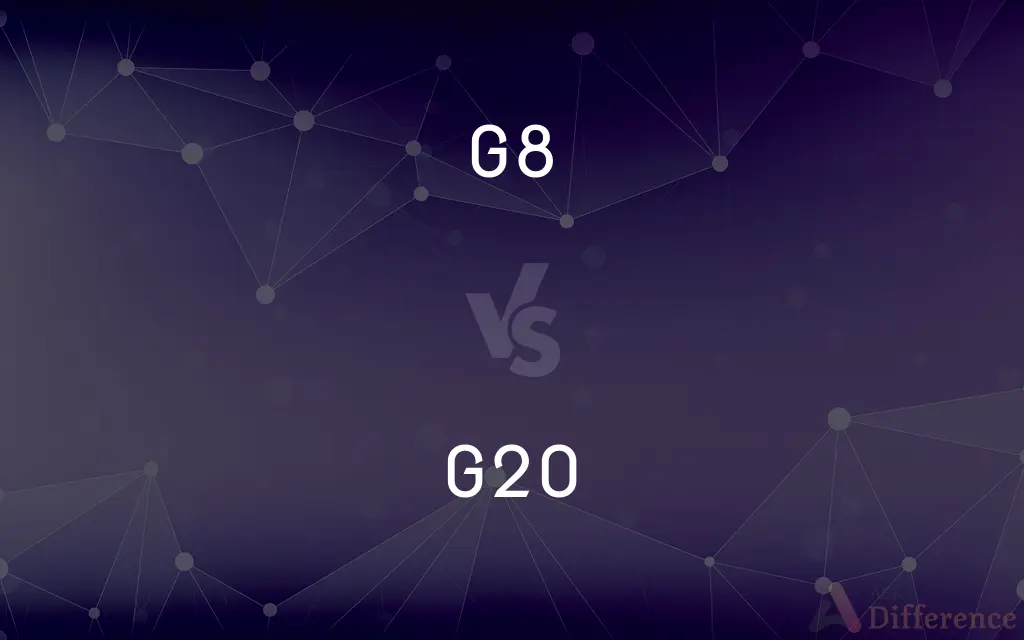G8 vs. G20 — What's the Difference?
By Tayyaba Rehman — Published on November 22, 2023
G8 is an intergovernmental organization of eight major economies. G20 includes 19 countries and the European Union, focusing on global economic issues.

Difference Between G8 and G20
Table of Contents
ADVERTISEMENT
Key Differences
G8 signifies a coalition of eight of the world’s significant and powerful economies, focusing on fostering global economic growth and stability. Conversely, G20 encompasses a broader spectrum, including 19 individual countries and the European Union, with an overarching goal of discussing and coordinating various international policy issues, notably those related to the global economy.
The composition of G8 includes a specific, smaller set of members: the United States, the United Kingdom, Germany, France, Italy, Japan, Canada, and Russia (although Russia's membership has been suspended). The expanded group, G20, incorporates a wider array of nations, which, in addition to the G8 members, includes countries like China, India, Brazil, Australia, and South Korea, ensuring a more diversified representation of the global economy.
In terms of scope, G8 has often directed its focus towards issues not only of economic stature but also encompassing political dimensions, given the relatively homogenous political ideologies and systems of its member countries. G20, given its more diverse membership, generally leans towards discussions largely rooted in global economic stability and policy, providing a forum where developed and developing nations can voice their perspectives on the international financial system.
Historically, G8 has been a platform primarily steering towards deliberations that reflect the interests and policies of the largely Western powerhouses. In contrast, G20, with its extended membership, serves as a forum that harbors a more inclusive view, embodying the interests and stances of a broader array of nations, thereby injecting diverse viewpoints from different corners of the global economy.
When considering global influence, G8 has consistently held a potent position, particularly given the significant economic and political weight of its member nations. While G20, through encompassing a larger and more varied set of countries, administers a broad, comprehensive platform that brings together major players from all continents, rendering a wider, albeit more complex, scope of influence and representation on the global stage.
ADVERTISEMENT
Comparison Chart
Numerical Representation
Indicates 8 countries
Indicates a group of 20 entities
Membership
Primarily western economies
Includes both developed and developing nations
Focus
Broad, including political aspects
Largely centered on economic issues
Global Influence
Significant but relatively concentrated
Comprehensive and diverse
Inclusivity
Limited to a specific group
More inclusive and varied
Compare with Definitions
G8
G8 aims to foster international economic cooperation.
G8 has historically focused on bolstering cooperative strategies to mitigate global financial crises.
G20
G20 includes both developed and developing nations.
The G20 enables a platform where diverse economies can exchange insights and formulate policies.
G8
G8 is a forum of eight major industrial countries.
The G8 tackled various global challenges, driving both economic and political dialogues.
G20
G20 is an international forum for governments and central bank governors.
G20 meetings serve as crucial moments where global economic policies are discussed and shaped.
G8
G8 involves regular meetings between member leaders.
At G8 summits, leaders aim to strategize and find common grounds on pressing international issues.
G20
G20 emerged in response to the financial crisis of the late 1990s.
G20 was instrumental in coordinating responses to the global financial crisis of 2008.
G8
G8 discussions often extend beyond mere economic contexts.
G8 has occasionally navigated through discourses that blend both financial and political scenarios.
G20
G20 aims to discuss and coordinate global economic policy.
G20 plays a pivotal role in fostering dialogue among the world's major economies.
G8
G8 largely encompasses western dominant economies.
G8 meetings often lead to significant policy discussions that influence global markets.
G20
G20 consists of 19 countries and the European Union.
The G20 collectively addresses issues pertaining to the global economy and financial markets.
G8
The countries of Canada, France, Germany, Italy, Japan, the United Kingdom, and the United States. Representatives from these countries meet to discuss economic concerns.
G20
A group consisting of the European Union and nineteen politically and financially influential countries that formed in 1999 to discuss economic concerns.
G8
Abbreviation of gate
Common Curiosities
How does the G20 function to influence global economic policies?
G20 brings together 19 countries and the European Union to discuss and coordinate international economic policies, ensuring stable and sustainable world economic growth that benefits all.
How is the membership of G20 determined?
G20 consists of 19 countries and the European Union, chosen to include the world's largest economies and to represent all inhabited continents.
What is the significance of G20 in dealing with global crises?
G20 is pivotal during global crises, as it provides a platform for member nations to develop coordinated policies and strategies to address economic and financial challenges.
How does G20 approach global trade and investment?
G20 seeks to facilitate international trade and investment, encouraging policies that promote openness, inclusivity, and sustainable development.
What is the primary objective of the G8?
G8 aims to facilitate global economic stability and growth by enabling dialogue and cooperation among eight of the world’s leading industrialized countries.
Who are the member countries of G8?
G8 includes Canada, France, Germany, Italy, Japan, the United Kingdom, the United States, and Russia (though Russia's participation has been suspended).
Why was Russia suspended from the G8?
Russia was suspended from the G8 in 2014 due to its annexation of Crimea, which was not recognized and opposed by other G8 countries.
Are decisions made by the G8 legally binding?
No, decisions within the G8 are not legally binding but carry significant influence due to the economic and political weight of the member countries.
How often do G8 meetings occur, and what is discussed?
G8 summits are held annually, where leaders discuss and strategize on various international issues, including economic policies, security, and developmental initiatives.
How does the G20 ensure that the interests of non-member countries are considered?
G20 organizes various engagement groups and dialogues with non-member countries, ensuring their interests and perspectives are considered in G20 discussions.
Are there other international groups similar to G8 and G20?
Yes, there are other international groups like BRICS (Brazil, Russia, India, China, and South Africa) and the European Union, which focus on various economic, political, and social issues.
Can a country apply to become a member of the G8 or G20?
No, there is no formal application process for G8 or G20 membership, as these groups were formed based on economic size and influence.
How are developing nations’ interests represented in the G20?
The G20 includes several developing nations like India, Brazil, and South Africa, ensuring their interests and perspectives are represented in discussions and decisions.
How does the G8 approach international security issues?
G8 addresses international security issues through dialogue and cooperative efforts, aiming to ensure peace, stability, and adherence to international law among its member states and globally.
What role do G20 summits play in shaping global economic strategies?
G20 summits are vital in shaping global economic strategies as leaders of the world’s major economies discuss, negotiate, and formulate policies that impact global economic governance.
Share Your Discovery

Previous Comparison
Sunglasses vs. Cooling Sunglasses
Next Comparison
Skimmed Milk vs. Double Toned MilkAuthor Spotlight
Written by
Tayyaba RehmanTayyaba Rehman is a distinguished writer, currently serving as a primary contributor to askdifference.com. As a researcher in semantics and etymology, Tayyaba's passion for the complexity of languages and their distinctions has found a perfect home on the platform. Tayyaba delves into the intricacies of language, distinguishing between commonly confused words and phrases, thereby providing clarity for readers worldwide.












































